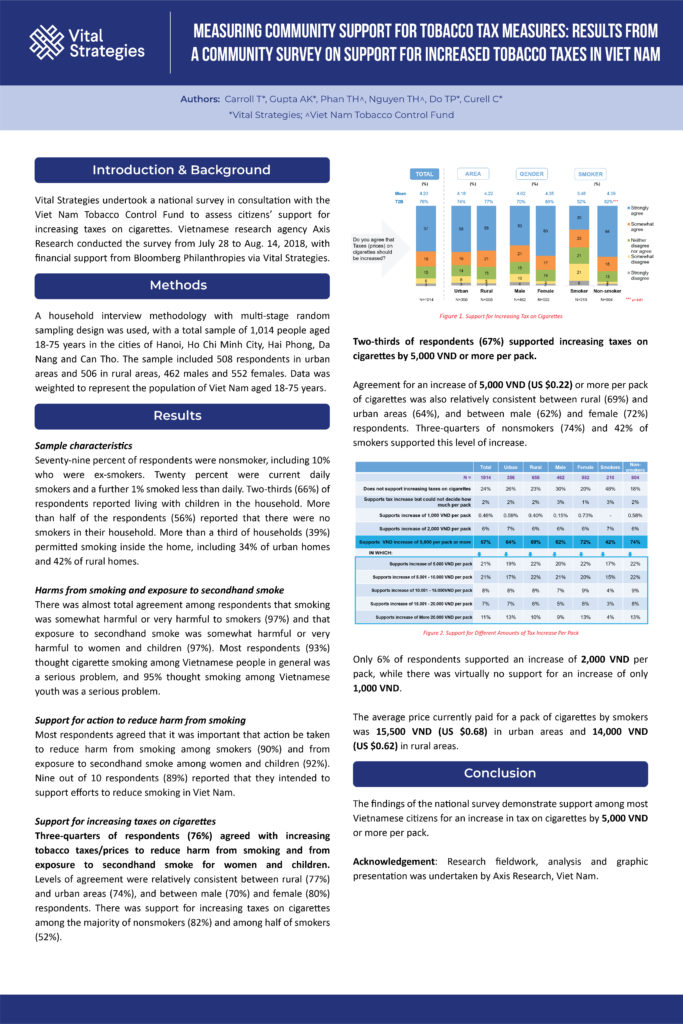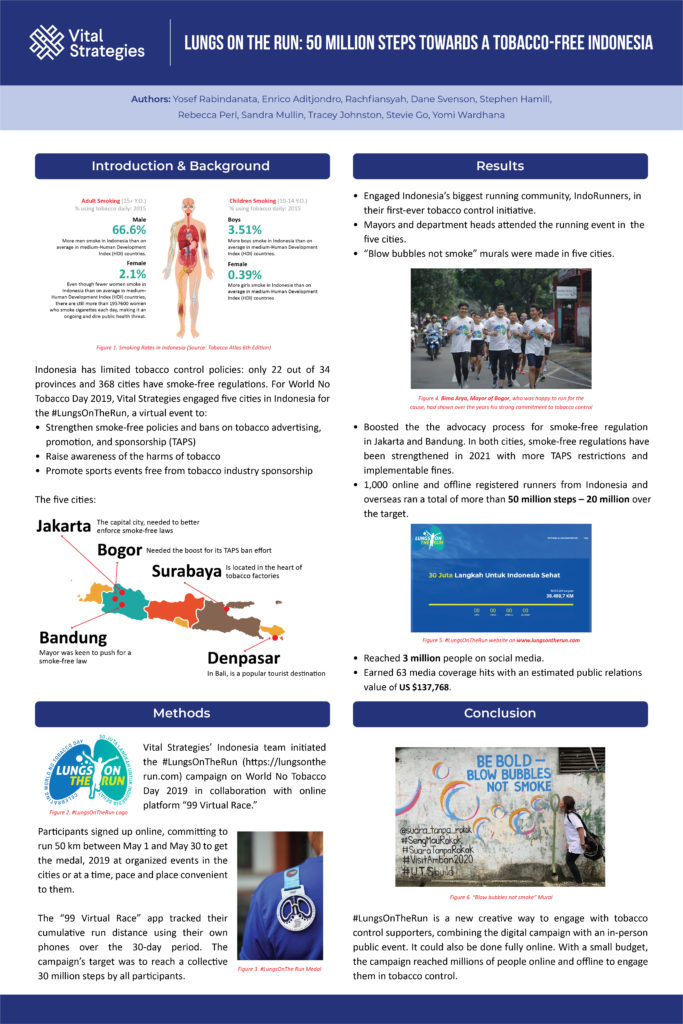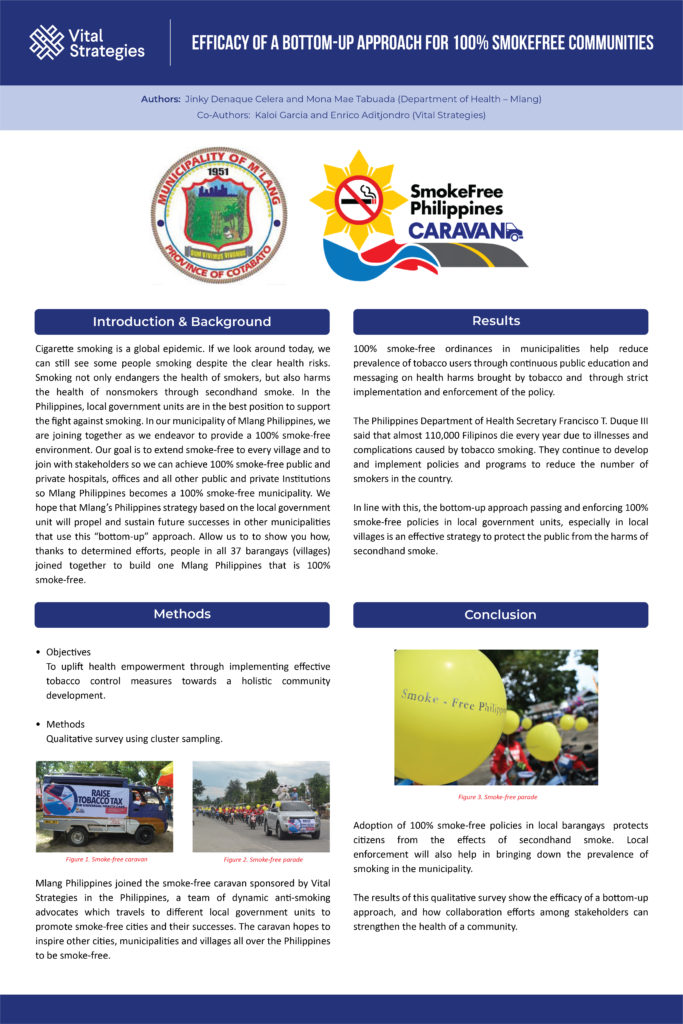Vital Strategies shared oral and poster presentations at the 13th Annual Asia Pacific Conference on Tobacco or Health
The tobacco industry is hooking a new generation of users and working to make tobacco more acceptable around the world. Through marketing and advertising, especially to young people, women and those in resource-constrained countries, the tobacco industry’s position as profiteers of the greatest source of preventable death and disease continues today.
But there is a help: strategic communication campaigns that highlight the harms of tobacco use can promote healthy behaviors, encourage people to quit and increase compliance with policies such as smoke-free workplaces. Vital Strategies has partnered with governments in 41 countries around the globe for more than a decade to deliver evidence-based population-level campaigns and highlight the dangers of tobacco to contribute to policy change.
Get Our Latest Public Health News
Join our email list and be the first to know about our public health news, publications and interviews with experts.
In early September 2021, as part of the 13th Asia Pacific Conference on Tobacco or Health, Vital Strategies’ Tom Carroll, Winnie Yu Chen, Ashish Gupta, Yosef Rabindanata, Kaloi Garcia, and Enrico Aditjondro presented findings from global advocacy efforts and successful communication campaigns for tobacco control. Here are some of the highlights from their presentations:

1. “Identifying effective community-targeted messages to build support for tobacco tax measures: formative research to test communication messages in Viet Nam” (oral presentation) and “Measuring community support for tobacco tax measures” (e-poster):
Tom Carroll, Senior Advisor for Vital Strategies presented results of groundbreaking message testing research on building public understanding and support for tobacco taxes in Viet Nam and a national poll measuring levels of community support for these policy measures.
The research conducted by Vital Strategies in partnership with the Viet Nam Tobacco Control Fund found that tobacco tax messages that resonated most effectively with both smokers and nonsmokers were those related to reducing the health consequences associated with smoking for smokers and their families, testimonials on the harms of secondhand smoke exposure, and protecting youth from starting to smoke.
As Tom explains, the research shows that there is “potential to implement community education campaigns that build support for increased tobacco taxes, particularly if those messages focus on the personal harm of individuals and families associated with tobacco use.”
Along with the message testing research, Vital Strategies undertook a national survey with support from the Viet Nam Tobacco Control Fund assessing citizens’ support for increasing taxes on cigarettes. Findings from the survey showed that over 76% of respondents agreed with increasing tobacco taxes to reduce harm from smoking and 67% of respondents supported a 5,000 VND (US $0.22) tax increase per pack of cigarettes.
Message testing is a scientific method designed to get insight from target audiences on whether communication concepts are effective and resonate with them.

2. “Results of Myanmar’s 2018 smokeless tobacco mass media campaign – Avoid betel chewing so you don’t regret your life choices”
In Myanmar, 18% of women and 59% of men aged 15-49 use smokeless tobacco.
Ashish Gupta, Senior Research Manager at Vital Strategies, discussed a campaign that included three public service announcements, aired on TV, radio and social media, to discourage smokeless tobacco use in Myanmar. After the campaign, which was designed in partnership with the People’s Health Foundation, was aired, the team devised an evaluation study to understand the recall and effectiveness of the campaign based on viewers ‘ and listeners’ changes in behavior and attitudes on smokeless tobacco.
Results from the evaluation found that:
- 81% of respondents recalled the campaign.
- Among those recalling the campaign, 94% to 96% believed that smokeless tobacco was harmful and that quitting would improve health.
The campaign was effective in beginning to change attitudes and perceptions of smokeless tobacco in Myanmar, further underscoring the role communication plays in reducing tobacco use. Ashish emphasized that “such a campaign should not only be implemented in Myanmar to address smokeless tobacco, but also considered by other countries.”
3. Experience of China’s “Voices of Victims” campaign
Winnie Chen, Head of the China Communication Program, explained how Vital Strategies has been supporting the government of China by implementing national and subnational tobacco control campaigns. The “Voices of Victims” campaign was launched in partnership with the Tobacco Control Office of China CDC in December 2018 and aimed to increase public understanding of the harms of tobacco and build support for the government’s smoke-free legislation. In her presentation, Winnie described the success of the campaign, which reached about 600 million people on China Central Television. After the campaign, a government notice advocating for smoke-free families was co-issued by the National Health Commission, All China Women’s Federation, and China Family Planning Association.
4. Lungs on the Run: 50 million steps toward a tobacco-free Indonesia
In a poster presentation, Yosef Rabindanata, Digital Communication Officer, Indonesia, illustrated findings from the #LungsOnTheRun campaign, launched in Indonesia in 2019 in collaboration with the online platform “99 Run.” The campaign was spread across five cities and used a hybrid online-offline advocacy approached aimed at strengthening smoke-free laws and policies on tobacco marketing, advertising and promotion. Participants signed up to run up to 50 km in an attempt to win the coveted gold medal and support tobacco control efforts. The campaign was largely successful: participants ran more than 50 million steps—20 million over the target goal of 30 million. Through increased awareness and community support, the campaign contributed to some ‘ policy wins. In early 2020, community support helped defend the city of Bogor’s smoke-free law, which had been challenged in a judicial review. In 2021, Bandung strengthened its smoke-free law with the support of community groups.

5. Efficacy of a bottom-up approach for 100% smoke free communities
Kaloi Garcia, Communication Officer, Philippines, and Enrico Aditjondro, Associate Director, Southeast Asia, along with the Department of Health in Mlang, Philippines are working to implement smoke-free policies in every village through local government efforts. The Vital team explained how the city of Mlang joined a smoke-free caravan that travels to promote smoke-free cities, and hosted a smoke-free parade. The focus on localized efforts or a “bottom-up approach” influenced local government units in another province, North Cotabato, to pass their own smoke-free ordinances.

The latest WHO report on the global tobacco epidemic finds that real progress is being made to reduce tobacco consumption. This is due to the work of governments, civil society organizations and public health professionals working to highlight the harms of tobacco and implementing proven smoke-free policies. As outlined by the presentations and posters above, we can continue reducing tobacco use through strategic communication campaigns and advocacy efforts that clearly and emphatically illustrate the dangers and health burdens of tobacco use.
Learn more about Vital Strategies Tobacco Control program.
Follow us on Twitter: @VitalStrat